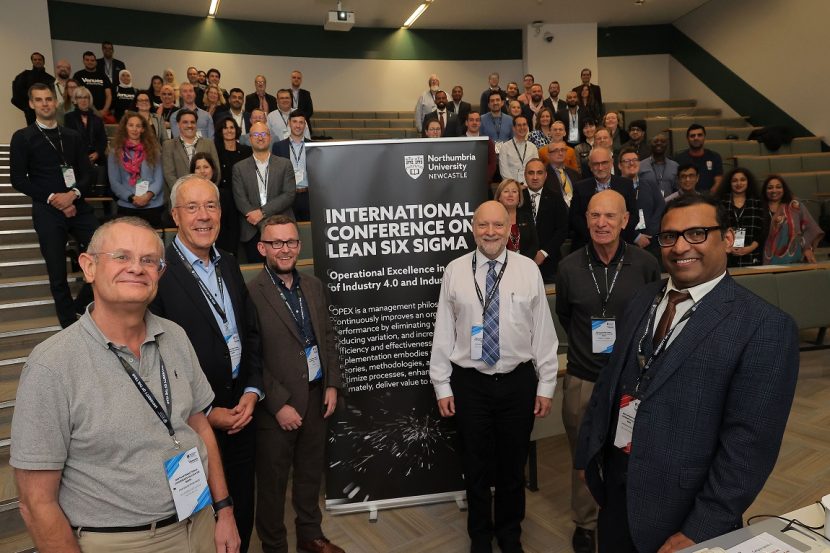Academics and practitioners from across the world visited Newcastle this week to attend the Ninth International Conference on Lean Six Sigma and Operational Excellence.
The conference, hosted by Northumbria University, was chaired by Prof Jiju Antony and co-chaired by Dr Alireza Shokri and Dr Adrian Small from Northumbria University, along with some more international co-chairs.
The two day conference, which attracted 85 delegates from 25 countries to Newcastle Business School, coincided with the launch of Northumbria University’s newly developed Innovation Centre of Excellence for Digital Supply Chain and Operation.
The conference theme focused on ‘Operational excellence in the era of Industry 4.0 and Industry 5.0’, and considered how businesses could improve effectiveness and efficiencies from digitalisation and adoption of emerging technologies such as Artificial Intelligence (AI).
Six pioneering experts and OpEx practitioners from the USA, Netherlands and UK made the keynote addresses at the Faculty of Business and Law, while the conference also featured speakers from as far afield as the Netherlands, Sweden, Portugal, Middle East, China and Brazil.
Northumbria University’s conference Chair and Founder Professor Jiju Antony, Vice President of Research for International Academy for Quality, welcomed the world class speakers and academics. Launching the new innovation hub, he said taking a lead on the Centre for Excellence puts Northumbria on the map nationally and internationally.
Professor Roger Hoerl, Brate-Peschel Professor of Statistics at Union College in New York, gave a talk on ‘Lean Six Sigma and operational excellence in the age of Digitization: Where are we today and where are we going?’
He said that as technology becomes ever more sophisticated, it’s important that we don’t lose the human and emotional intelligence. Industry 5.0 – the potential future stage of industrial development – needs to bring humans back into the loop to replace the human intelligence and creativity that has been lost.
AI has moved from making predictions to making important decisions, said Professor Antony, but the success rate of AI projects is lower than the hype suggests. He made a number of recommendations which include making improvement to a core business function led by a CIMO (Chief Improvement Officer) and training workers to improve the success rates of AI projects.
He said: “Industry 5.0 is on its way. Much has changed but some stays the same and the 4.0 challenges still exist. We need a new holistic approach which brings a portfolio of improvement methods under one umbrella – and we need human oversight because machines don’t understand ethics.”
Jd Marhevko, VP of Quality for ZF Grup’s Electronics & ADAS Division in the USA, spoke about using strategic planning to leverage digitisation as a way of growing an organisation’s operational excellence.
She said: “We want to take the five stages of strategic planning and leverage digitalisation into internal and external scanning processes, into our mission, vision and value statements and our strategic objectives.
“We need to do better and we need to digitise across our transformation processes. The opportunity for digitising transactional processes is huge – for example, cutting invoicing down from 15 days to 3 or removing errors in forecasting by 90%.
“We need to create Key Performance Indicators (KPIs) with intent where effectiveness and efficiency measurements are taken. If you don’t create KPIs with intent your organisation will lose its unified direction. Cutting edge trends in strategic planning and digitised modelling show that companies that embrace digitisation position themselves among the most advanced and influential businesses in the world.”
Professor Peter Hines, from Enterprise Excellence Network in the UK gave the third keynote address. The Co-Founder of the Lean Enterprise Research Centre at Cardiff University and a multiple Shingo Research Publication Award winner for his co-authored books, Professor Hines spoke about the Future Direction of Lean Six Sigma in the Digital Era: Technology and People.
After highlighting some of his key research findings, he concluded that emotional intelligence is critical, with behaviour and mindset, change and leadership as the most important aspects.
He said: “We need to build on what we’ve learned from these improvement methods like Lean and Industry 4.0. We need to learn from the mistakes we made 20 years ago and recognise that people are key. There is much academic interest in Lean, Industry 4.0 and other tools but industry is less focused on these things.
“If you don’t know how to start it’s best to start to think about the company culture by getting the mindset of the senior leaders, then looking at the processes next and then the tools.”
To find out more about Northumbria University visit https://www.northumbria.ac.uk/
To find out more about Newcastle Business School at Northumbria visit:
https://www.northumbria.ac.uk/about-us/academic-departments/newcastle-business-school/

